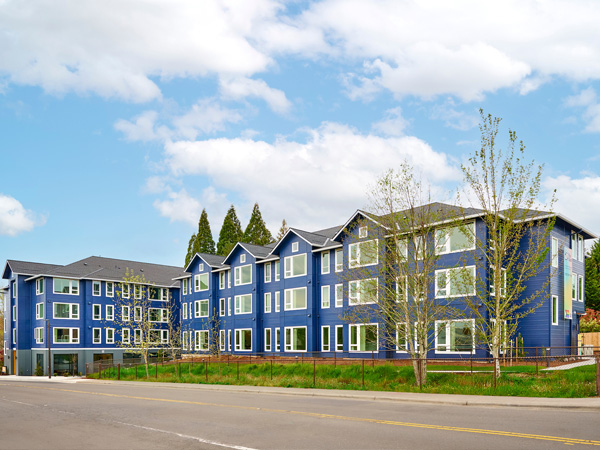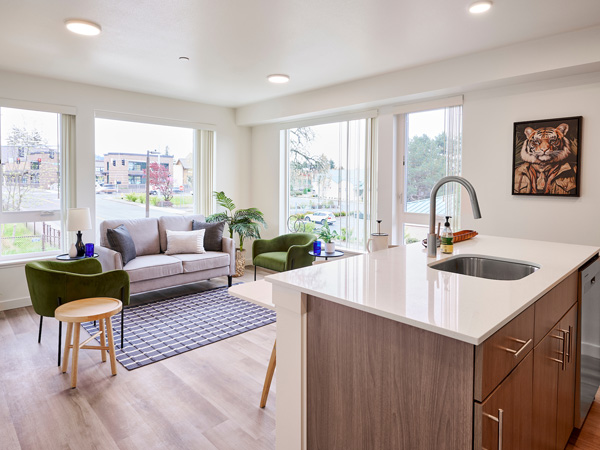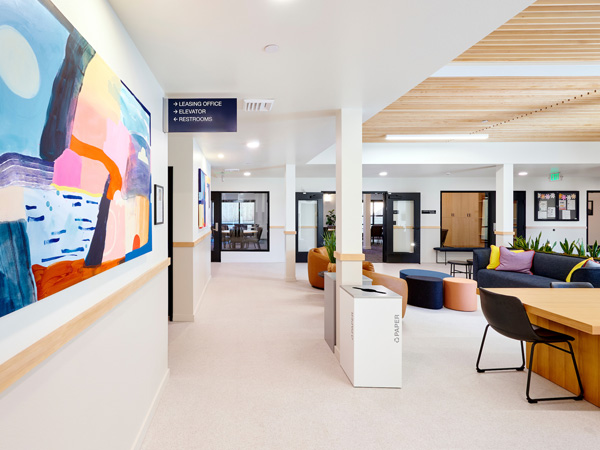Building Affordable Housing for LGBTQ+ Seniors on Surplus Church Land
 The Opal was completed in April 2024 in Portland, Oregon, and is helping to address the unique housing needs of LGBTQ+ seniors. Photo credit: Bill Purcell Photography
The Opal was completed in April 2024 in Portland, Oregon, and is helping to address the unique housing needs of LGBTQ+ seniors. Photo credit: Bill Purcell Photography
In Portland, Oregon, Christ United Methodist Church and Home First Development Partners created the Opal, an affordable housing development serving LGBTQ+ seniors aged 55 and older. The Opal is not only helping the church realize its mission of service to the community but also securing its long-term financial well-being by developing its surplus land amid declining church attendance. The Opal is increasing the city's supply of affordable housing amid broad affordability challenges. Research from the National Low-Income Housing Coalition concluded that the greater Portland area has a deficit of approximately 81,000 homes affordable to households earning no more than 50 percent of the area median income (AMI). The Opal is also notable for its use of voter-approved gap funding and for advancing policy objectives that ease affordable housing development by area religious institutions.
Meeting the Housing Needs of LGBTQ+ Seniors
The Opal was completed in April 2024 and consists of 54 units, of which 45 have 1 bedroom and 9 have 2 bedrooms. Twenty-six units rent to households earning up to 60 percent of AMI, and the remaining 28 rent to households earning up to 30 percent of AMI; 15 of the units at the 30 percent AMI level have project-based vouchers that subsidize residents' rent and fund services. The Opal's 5,000-square-foot community space features a kitchen, a multipurpose room, a lounge, a community activities room, an outdoor patio, space for service provision, and laundry facilities. The church donated the supplies for the communal kitchen.
Elder Pride Services, a program serving LGBTQ+ seniors that is run by area nonprofit Friendly House, provides residents with educational, social, recreational, and fitness and wellness programming. In addition, Elder Pride Services helps residents access benefits, navigate resources, and coordinate other in-home services as needed, supporting active, independent living. The Opal is within walking distance of transit, shopping, a library, and a grocery store as well as recreational facilities including an indoor pool, a ballfield and running track, and walking paths.
 The Opal offers 54 units of affordable housing, including 45 one-bedroom and 9 two-bedroom units. All units can be modified to aid residents' aging in place and include senior-friendly design choices. Photo credit: Bill Purcell Photography
The Opal offers 54 units of affordable housing, including 45 one-bedroom and 9 two-bedroom units. All units can be modified to aid residents' aging in place and include senior-friendly design choices. Photo credit: Bill Purcell Photography
Although the Opal is not an assisted living facility, the design team nevertheless made deliberate choices to accommodate the increased likelihood of physical limitations in older residents, reports Ben Pray, chief executive officer of Home First Development Partners. The floors have no raised edges to minimize tripping; a tackier flooring option helps prevent slipping; table-height breakfast counters mean that seniors do not have to get onto stools to sit down; and side-by-side (rather than stacked) washer and dryer units promote accessibility for keeping up with laundry. Units at the Opal can be modified to adapt to residents’ changing accessibility needs as they age, allowing them to comfortably age in place.
Thanks to its explicit nondiscrimination policies protecting LGBTQ+ residents, the Opal is addressing the unique needs of this population. Older LGBTQ+ adults are more likely to be estranged from their families of origin, are less likely to have children, and are more likely to be single than their heterosexual counterparts. These factors reduce the likelihood that family support is available as people age and vulnerabilities to housing insecurity increase. Statistics confirm this precarity: 48 percent of LGBTQ+ seniors report experiencing housing discrimination, and 34 percent report feeling worried about having to “re-closet,” or conceal their sexual identities, to live in senior housing communities.
Although the Opal is open to anyone who meets the development’s age and income requirements regardless of sexual or gender identity, the development gives preference to referrals from Elder Pride Services, whose target clientele tend to identify as LGBTQ+. Subtle design choices throughout the development, such as the use of rainbow motifs, as well as works commissioned from local artists support LGBTQ+ residents, says Pray. In addition, when the building opened, church members welcomed new residents with 60 quilts that the congregants made themselves.
Metro Portland's Policies Support Church-Driven Housing Development
 Common spaces at the Opal promote social activity and facilitate service provision, and colorful artworks commissioned from local artists resonate with the inclusive and welcoming ethos of the Christ United Methodist Church and its development partner, Home First. Photo credit: Bill Purcell Photography
Common spaces at the Opal promote social activity and facilitate service provision, and colorful artworks commissioned from local artists resonate with the inclusive and welcoming ethos of the Christ United Methodist Church and its development partner, Home First. Photo credit: Bill Purcell Photography
Development costs for the Opal totaled slightly more than $23 million, including nearly $8 million in equity raised from the sale of low-income housing tax credits. Crucial gap financing, says Pray, came from the $6 million in grant funds from the Metro affordable housing bond, a program passed by area voters in 2018 to authorize a $652.8 million bond for creating affordable housing. The bond is administered by Metro, the regional agency supporting the planning and coordination of the Portland area's growth, infrastructure, and other issues that transcend jurisdictional boundaries. The bond is expected to create homes for approximately 14,000 people, exceeding its initial goal by 2,000 people.
Portland also has recently changed its policies to encourage religious institutions with surplus land to develop affordable housing. In 2020, the Portland City Council amended the city's zoning regulations to facilitate affordable housing production on land owned by religious and other community groups. The Expanding Opportunities for Affordable Housing project gives eligible institutions a "by right" ability to develop affordable housing, reduces parking requirements for such developments by 50 percent, and eases site size requirements and land use review thresholds. The reforms also offer institutions technical assistance, which is important because most religious groups lack the in-house expertise required to develop their surplus land. The city's Bureau of Development Services assigns a specialist to advise on regulations relating to religious institutions, zoning, and the land use review process as well as a process manager to assist with the permitting process; the bureau also consults organizations on other development issues including architecture, design, and stormwater management.
Pray describes his organization as having significant experience working with mission-driven clients, making the partnership with Christ United Methodist Church a particularly well-aligned one. As the Expanding Housing Opportunities for Affordable Housing project takes off, Pray believes that the Opal will serve as a tangible model for other organizations and developers interested in pursuing this type of project and partnerships moving forward.
Metro. 2024. “The Opal brings affordable, inclusive homes for older adults to Cedar Mill,” news, 16 April. Accessed 23 May 2024; Metro. n.d. “The Opal.” Accessed 23 May 2024; Document provided by Ben Pray, chief executive officer, Home First Development Partners; Interview with Ben Pray, 17 May 2024; Metro. n.d. “Affordable housing bond program.” Accessed 23 May 2024; National Low Income Housing Coalition. 2024. “The Gap: A Shortage of Affordable Homes.” Accessed 23 May 2024; City of Portland Bureau of Development Services. 2020. “Zoning Code Information Guide: Religious Institutions — BDS Assistance with Affordable Housing Projects,” 11 June. Accessed 23 May 2024. ×
Home First Development Partners. n.d. “The Opal Apartments.” Accessed 23 May 2024; Metro. n.d. “The Opal.” Accessed 23 May 2024; Metro. 2024. “The Opal brings affordable, inclusive homes for older adults to Cedar Mill,” news, 16 April. Accessed 23 May 2024. ×
Metro. n.d. “The Opal.” Accessed 23 May 2024; Friendly House. n.d. “Elder Pride Services.” Accessed 23 May 2024; Friendly House. n.d. “Welcome to Friendly House.” Accessed 23 May 2024. ×
Interview with Ben Pray, 17 May 2024; Metro. 2024. “Agenda: Housing Bond Oversight Committee Meeting,” 15 April. Accessed 23 May 2024. ×
Metro. n.d. “The Opal.” Accessed 23 May 2024; Christ United Methodist Church Cedar Mill. n.d. “The Opal.” Accessed 23 May 2024. ×
Interview with Ben Pray, 17 May 2024; Metro. 2024. “The Opal brings affordable, inclusive homes for older adults to Cedar Mill,” news, 16 April. Accessed 23 May 2024. ×
Correspondence with Ben Pray, 22 May 2024; Interview with Ben Pray, 17 May 2024; Metro. 2024. “The Opal brings affordable, inclusive homes for older adults to Cedar Mill,” news, 16 April. Accessed 23 May 2024; Metro. n.d. “Affordable housing bond program.” Accessed 23 May 2024; Metro. n.d. “What is Metro?” Accessed 23 May 2024. ×
City of Portland Bureau of Development Services. 2020. “Zoning Code Information Guide: Religious Institutions — BDS Assistance with Affordable Housing Projects,” 11 June. Accessed 23 May 2024; Interview with Ben Pray, 17 May 2024. ×
Interview with Ben Pray, 17 May 2024. ×
